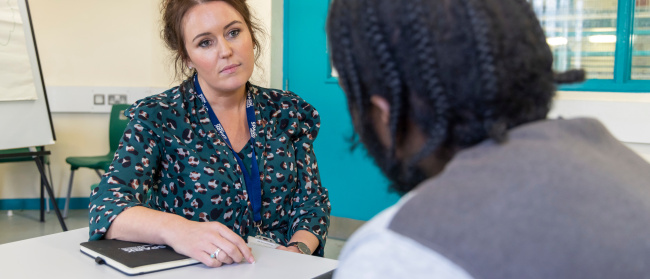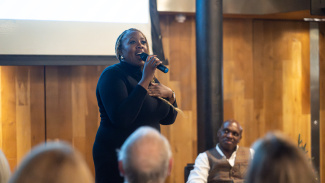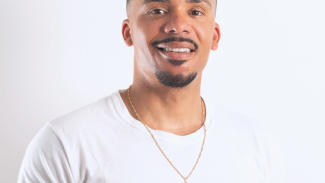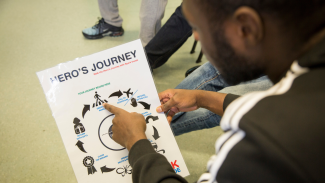Daniel
Daniel is a man with a mission. Upon leaving custody, he was determined to improve rehabilitative processes and the resettlement pathways for individuals within the criminal justice system. With numerous ideas in mind, he focused on one: My Resettlement, an app that has been growing from strength to strength.
This driven young man, who studied law through distance learning at the Open University while incarcerated and later switched to studying criminology in open conditions, explains why he found education in prison so valuable:
“I focused on engaging in what I believed would best prepare and serve me after custody. Because, at the end of the day, it’s your body that’s in prison, right? Your mind can be wherever you choose.”
Influenced by his own journey, he wants to tackle the problems in the system for others.
“When you’re exposed to so many problems within a failing system that’s supposed to aid your rehabilitation, you face a choice: you can either wish things were different or be the change you want to see. I chose the latter. After years of planning, sketching, taking notes, and learning, coaching became exactly what I needed to help me define my short, medium, and long-term goals — understanding my current state, desired state, and the obstacles in between.”
It was after speaking with author Angela Kirwin about her book Criminal that Daniel was introduced to Spark Inside and the concept of life coaching. He was eager to explore how coaching could help him navigate his journey and turn his vision for change into action.
“I wasn’t able to engage with anyone on the level needed to challenge my ideas while in custody.”
Having not done coaching before, Daniel entered the process with an open mindset, thinking to himself:
“You’ll never know everything, right? There’s always more to learn, no matter what. So, I saw this resettlement phase as a great opportunity to speak with a coach, hoping it would expand my horizons even further.”
As a naturally driven person, Daniel didn’t need his coach to be an accountability buddy, but he did need someone who could actively listen and ask the right questions:
“I’ve always definitely been driven to get things done, and never shy away from my responsibilities. I always had an idea of what I wanted to do, even though I didn’t necessarily know exactly how I was going to do it.”
Daniel expressed his gratitude for being paired with the “brilliant” Spark Inside coach, Lynne. When asked what made their coaching relationship so effective, he shared:
“Lynne and I come from different generations, and I think that made a real difference. Her life experience — shaped not by a single event or shared history, but by the perspective that comes with time — was invaluable. She listened deeply, guided my thoughts, and asked insightful questions in response.”
Daniel shared, “Lynne’s attention to detail and her skill in unpacking complex thoughts from past experiences was amazing. She asked just the right questions to help me find my own answers. I truly looked forward to our sessions.”
He also appreciated her valuable skills of drawing on concepts and ideas they’d discussed in previous coaching sessions:
“Lynne’s ability to grasp key points from one session and reintroduce them in subsequent conversations, applying them to the current discussion, creates a powerful dynamic. This not only allows us to dive deeper into the topics at hand but also helps illuminate the path forward and solidifies the plan.”
Daniel’s key takeaway from the coaching sessions was tips on how to approach big projects:
“Being able to break things down into manageable chunks, so to speak. First things first, while keeping the long-term objectives and the steps needed to reach them in mind.”
Lynne also continued to use Daniel’s metaphor of a cocoon to help process his experience in prison:
“We spoke a lot about the cocoon — a concept I explore in my book on cellular confinement. It’s about creating a world within an uncontrollable environment. While in custody, I built my own small ecosystem, not just as a protective mechanism but as a space to stay focused and productive. One of the main challenges in coaching was learning how to unpack, deconstruct, and reassemble that system to serve me in a new context. Our conversations centred on how to repurpose these systems and disciplines to help me thrive in a different environment.”
Daniel describes why he needed to form his own ‘cocoon’ in custody, an environment he often felt he couldn’t control, but he could control himself:
“Being isolated for long periods of time — will that serve me now? Probably not. But coaching helped me understand how to take what worked for me back then and adapt it to help me now.”
How does he feel now after completing his coaching? It’s a tough question, but his response reveals his openness, honesty, and self-reflection,
“I feel positive, ready, and determined to move forward. Do I feel happy? Who knows? Happiness doesn’t really resonate with me right now. I have a goal, and I won’t stop until I achieve it. If reaching it makes me happy, great — but I’m not chasing happiness; I’m chasing accomplishment.”
Daniel is undoubtedly on the move, so what’s next? He’s currently developing My Resettlement, an app designed to support the rehabilitation and resettlement of individuals in the criminal justice system. Alongside this, he offers consultancy services, driven by a determination to tackle the systemic issues he and countless others have experienced and continue to face.
“It’s a systemic problem. They’re focused on keeping the wheels turning in a broken system — one that perpetuates violence, disorder, and hinders real progress. My solutions come directly from my lived experiences and what I witnessed first-hand in prison, not from behind a desk. I hope key decision-makers are willing to integrate these solutions instead of forcing square pegs into round holes.”



